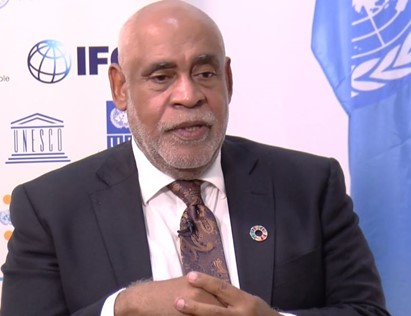The United Nations Resident Coordinator to Ghana, Charles Abani, has accentuated the importance of the private sector in scaling-up efforts toward achieving the Sustainable Development Goals (SDGs).
A few years into its implementation, it is apparent there exists a huge SDG financing gap. For instance, in Ghana’s case the gap was estimated at around US$43billion in 2020, with a total cumulative 10-year SDG financing gap at US$431.6billion. However, this financing gap is estimated to have widened due to the impact of COVID-19 pandemic, Russia-Ukraine crisis and general rise in prices across the world.
Given that filling this gap requires a smarter financing approach that seeks domestic as well as international public and private investment opportunities, the Resident Coordinator emphasised that aside from partnerships the private sector’s role cannot be underestimated.
“That money cannot come from the government of Ghana or development partners alone; the private sector will be key in making this happen, it is possible,” he said.
He stressed that the private sector’s centrality to the country’s progress cannot be taken lightly, as it will not happen without them.
He explained that: “The private sector is key to making this happen because they are important, and I say this because of their leadership. You do not wait to be led in the private sector; rather, you are intrinsic leaders – and that is needed. The second thing is that the sector encapsulates vision and optimism. Also, you innovate and have resilience and capability to find solutions and agilely work around things to keep your business running and the economy on fire.
“You also have discipline to run your business and achieve your goals, which is often lacking elsewhere. You are also influential, as many of you run businesses that employ thousands of people; and if you want a peaceful Ghana, it is possible. And finally, unashamedly, I will say you have the money – not as in giving it to the poor or as charity, but investing it and leveraging its value to create opportunities that build Ghana’s GDP and others around you.”
He made these remarks at the 2023 Ghana Chief Executive Officers Awards, which acknowledges and rewards the contributions of corporate executives and entrepreneurs who are making outstanding efforts to attain sustainable development in the country.
Mr. Abani added that the private sector, working hand in hand with government and other stakeholders, will put the country in a better frame to achieve the goals, Agenda 2063 and the key priorities which have been agreed on globally.
The key priorities include: jobs and social protection; climate action, thus building resilience around climate; harnessing opportunities of the digital transformation; transforming food systems across the globe; building sustainable energy solutions and educating young people to strive for the future.
He urged the business community to stay indigenous – reiterating that Africans have the solutions they need to develop Africa, and that business leaders must utilise these indigenous ideas.
He highlighted SDG 17, adding his voice to calls stressing the need for partnerships among government, the people and private sector to protect the planet, reduce inequality and prioritise sustainability.
“Only 30 percent of SDGs are on track, and only 30 percent of countries in Africa are on track to achieve this by 2030. Women will be left behind if we don’t do something radical. Hunger is back to the level it was in 2005. Record numbers of conflicts and displaced persons are all over the world – what the Secretary-General described as a crisis and an emergency.
“The diagnosis suggests that unless we do a significant amount of work, entering into a rescue mode – which, happily, leaders have committed to – we will not achieve a prosperous world that also takes care of everyone, reduces inequality and protects our planet,” he noted.










